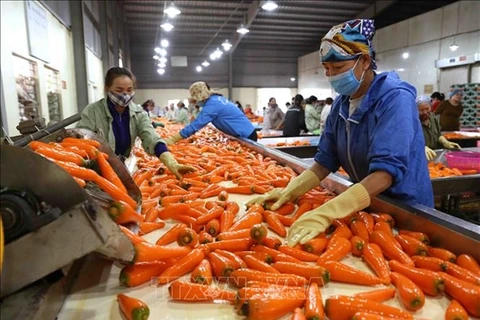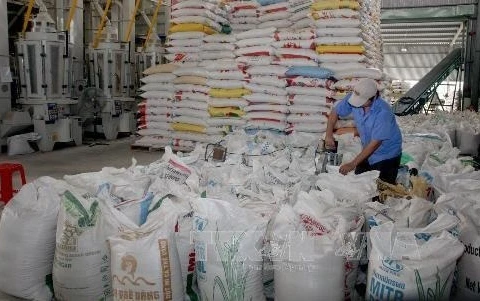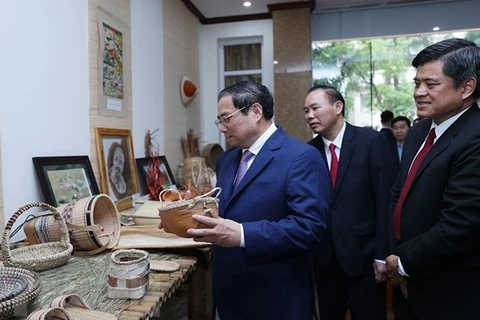 In context of uncertainty and complicated fluctuations, the agricultural sector’s role as the backbone of the economy has been affirmed.(Photo: VietnamPlus)
In context of uncertainty and complicated fluctuations, the agricultural sector’s role as the backbone of the economy has been affirmed.(Photo: VietnamPlus) Hanoi (VNA) – Last year, agro-forestry-fisheries exports hit a record of 53.22 million USD, up 9.3% year on year, with a trade surplus of 8.5 billion USD, accounting for 76% of the total trade surplus of the country.
On the occasion of the New Year of the Cat, the Minister of Agriculture and Rural Development Le Minh Hoan has granted VietnamPlus an interview on the achievements of the agricultural sector in 2022 and its sustainable development plan for the future.
Reporter: Overcoming fluctuations on the world market in 2022, agro-forestry-fisheries exports had a wonderful year. How do you assess this result?
Minister Le Minh Hoan: Despite difficulties such as the COVID-19 pandemic, supply chain disruptions, high logistics and raw material costs, looking back at what has been achieved by the agricultural industry, businesses and farmers in 2022, we are proud of our results.
The things that we can be proud of is not only the number, but the high evaluation from the Party and State leaders as well as the whole community about the role and position of the agricultural sector. In context of uncertainty and complicated fluctuations, the sector’s role as the backbone of the economy has been affirmed. The agricultural sector has not only contributed to the overall growth of the economy but also helped settle social issues, especially food security.
 Agricultural economy development is an irreversable trend and will not reverse in the future, Minister Le Minh Hoan said (Photo: VietnamPlus)
Agricultural economy development is an irreversable trend and will not reverse in the future, Minister Le Minh Hoan said (Photo: VietnamPlus) The strength of the agricultural sector is not only to solve growth problems but also to contribute to inclusive social security for tens of millions of farmers and rural residents, tens of millions of workers in the agricultural sector and the service sector. This is not shown in the numbers. If we only talk about growth numbers, we will not see the full role of agriculture in society.
Reporter: In your opinion, what is the strongest breakthrough of the agricultural sector in 2022?
Minister Le Minh Hoan: In 2022, we clearly saw a change in mindset from agricultural production to agricultural economy. The agricultural economy mindset has begun to take root in the mind of society, farmers and businesses. We see that it is not possible to return to the agricultural production path of taking the yield criterion as the goal to strive for anymore.
In 2022, a lot of research by experts, scientists, as well as many actions by associations, industries and farmer organisations have begun to shift the thinking on how to create added value for agricultural products following the trend of agricultural economy.
We also see the clearer role of the market, as without developing markets, our production will stagnate. The sector’s role in creating spaces for market development was clearly shown in 2022.
Reporter: The thinking of market development for agricultural economic development took shape in 2022, how do you evaluate the current trend of increasing the value of agricultural products?
Minister Le Minh Hoan: I think this will be an irreversible trend and will not change in the near future. Because businesses know about it, they have to go to higher-level markets to obtain higher value, higher profits for themselves and higher incomes for farmers.
The market mindset has begun to change. If in the past it was a product-based mindset, which means we make what we can do, but now we have changed to a market-based mindset where we make the product that the market requires, switching from selling what you have to selling what the market needs.
 The agricultural sector has not only contributed to the overall growth of the economy but also helped settle social issues, especially food security, according to Minister Le Minh Hoan (Photo: VietnamPlus)
The agricultural sector has not only contributed to the overall growth of the economy but also helped settle social issues, especially food security, according to Minister Le Minh Hoan (Photo: VietnamPlus) The fact that we have exported high quality rice to the European market or Japan is evidence that we have gotten rid of the quantity-based mindset to the quality-oriented market. This will help as we move to drive production following the requirements of particular markets such as the EU, Japan, and the US.
Currently, farmers are gradually stabilising material areas, for example in An Giang, there are enterprises like Loc Troi and Tan Long who have shaped the rice material area for each market depending on answering the question of which market needs what type of rice and what level of quality. The link between businesses and farmers is helping form stable, long-term and sustainable material areas.
Although rice exports to the EU has yet to be on a large scale in the current period with modest volume, there are signs that once we change, we will create new and higher added values. Enterprises, in turn, will lead farmers to ensure product quality right from the variety selection stage to farming processes, standardising quality of agricultural products, including rice for each type of market.
 China has approved another 47 farming area codes and 18 packaging facility codes for importing durian from Vietnam (Photo: VietnamPlus)
China has approved another 47 farming area codes and 18 packaging facility codes for importing durian from Vietnam (Photo: VietnamPlus) Only when enterprises gradually get rid of the “vending” mindset to thinking of trading and shaping a long-term market, can we set up stable and long-term connectivity with farmers. I think those are the real achievements of the agricultural industry when escaping the "curse" that farmers can only think seasonally, businesses only think about particular trading deals. Now there is no concept of "season" or "deal", but we are thinking in a long-term fashion. We are not thinking for one side but thinking for both sides, both businesses and farmers.
In recent years, the Ministry of Agriculture and Rural Development and the Ministry of Industry and Trade have continuously organised many forums to show businesses what type of market has what kind of requirements. We should not "wear uniforms" or homogenise products, but create many market segments abroad and even in the domestic market.
Reporters: Entering 2023, what message do you want to send to businesses and producers to reap more success and make transition in the agricultural sector in a harmonious, sustainable and multi-value manner following the spirit of the Resolution 19?
Minister Le Minh Hoan: International experts predicted that 2023 can be an even tougher year when the global inflation starts to impact all countries. When the world changes, we must employ our own strategy to actively adapt to the situation.
Market standards are becoming more and more stringent. For example, the EU market or the US and Japanese markets have strict requirements in traceability. Consumers are accessing agricultural products not only by price, by quality but also by farming processes with consideration whether the processes affect the natural environment and biodiversity, create greenhouse effect and worsen climate change or not, including those in the field of cultivation and fisheries.
The IUU yellow card is evidence showing that consumers are not only paying attention to the deliciousness of shrimp, squid, and tuna, but also other issues such as how these products are caught and is there a violation of international law regarding the environment?
 The number of Vietnamese fruits exported to the Chinese market through official channels is increasing (Photo: VietnamPlus)
The number of Vietnamese fruits exported to the Chinese market through official channels is increasing (Photo: VietnamPlus) It is the same for other agricultural products. Consumers are also interested in whether the product is grown in areas that impact nature or in areas where forests are destroyed? For coffee and cashew nuts, they will wonder where the products are made and is it due to deforestation to get land resources for agricultural cultivation?
What I want to emphasise is there are pressures forcing us to change in the time to come. When we make active change, we will suffer less risk and see more opportunities to build the image of a responsible and sustainable agricultural sector.
At the 26th UN Climate Change Conference, Vietnam gave a commitment to net-zero emission by 2050. Vietnam also promised a responsible and sustainable agriculture when joining the global value chain and engaging in the global food and foodstuff supply chains. These messages must be transformed into specific actions, into responsibilities and production practices of farmers and businesses.
Currently, rural employment is an important issue, and the rearrangement of production will create a lot of jobs for rural labourers. The recent growth figures we have recorded have yet to reflect how many jobs have been made. Therefore, growth must be associated with employment and the core issue of growth is employment.
Settling problems in agricultural employment or shifting to industry-services, creating more jobs by developing the agricultural economy, rural non-agricultural economy and rural services are the issues that the national target programme on new-style rural area building in the 2021-2025 period and the strategy for sustainable agriculture and rural development are heading for.
Reporter: Thank you very much!























